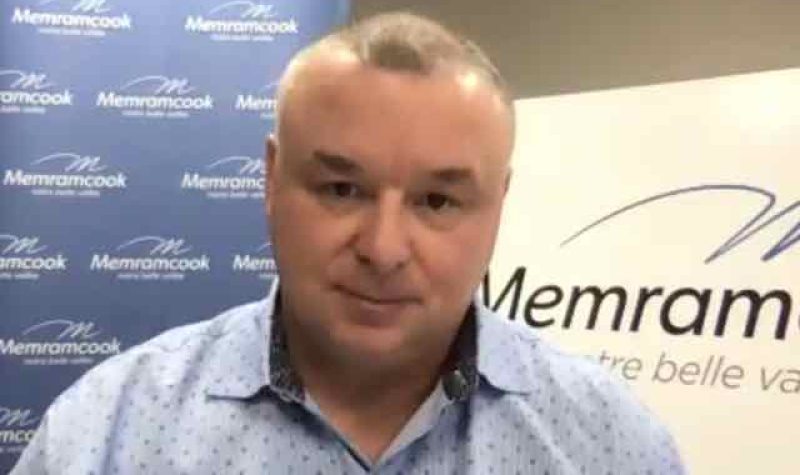175 households in Memramcook will be able to access municipal water after an $8.4 million project announced Wednesday is completed.
Hear this story as reported on Tantramar Report:
Beauséjour MP and Minister for Intergovernmental Affairs Dominic LeBlanc made the announcement online Wednesday afternoon, along with New Brunswick Environment and Climate Change Minister Gary Crossman, and Memramcook Mayor Michel Gaudet.

The federal government is investing just over $5 million in the project, to cover 60% of the cost. The province will contribute $2.8 million, to cover another 33%. The remaining $558,000 will be contributed by the Town of Memramcook.
The project is phase three of a larger water system expansion project that started in 2015, and added 264 new users to the municipal water system.
The plan involves converting a test well into a production well in the East Memramcook region. Once completed, the project will increase water pressure and provide for an additional 175 users.
That will bring the total users of Memramcook’s municipal water system to 889 households, according to numbers on the town website.
After a very dry summer in 2020, many homes in Memramcook were left with dry wells, and people had to have water trucked in. The Village of Memramcook covered 75 per cent of the cost to have water delivered, up to a $1,000 per house.
Memramcook mayor Michel Gaudet says this project will not, unfortunately, reach everyone with well issues.
“Will it alleviate every well that is low or dry in Memramcook? The answer is no,” said Gaudet on Wednesday. “It would cost $100 million to do all of Memramcook,” said Gaudet. “Anybody who is familiar with our beautiful and vast village, it’s a very big area, spread out… It’s bigger than probably any city in New Brunswick and a lot of cities across Canada. That’s why people enjoy coming and living here. But it offers challenges.”
Memramcook Tantramar MLA Megan Mitton says she’s really glad to see this funding announcement from the three governments, but is concerned the need is greater than the area covered.
“There are other parts of Memramcook and even other parts of the province where this is a problem,” says Mitton. “And so we need to ensure that everyone does have access to water and look at solutions to make sure that we’re addressing this problem for everyone that’s facing it.”
Mitton acknowledges that size matters, especially when it comes to access to municipal services like centrally treated water. “Memramcook is huge. And New Brunswick is rural. And that is a major barrier for having access to water,” says Mitton.
“A lot of people are on wells. And so we need to look at what are the solutions,” says Mitton, “and that’s why we need to have New Brunswick’s water strategy implemented, in addition to making sure that the federal and provincial governments assist municipalities when they do need infrastructure like this.”
“Municipalities shoulder a lot of the burden of climate change adaptation and of infrastructure,” says Mitton, “but they have the smallest budgets.”
Federal funding for the project is coming from the Rural and Northern Infrastructure Stream of the Investing in Canada fund, the same pot that has funded two phases of Sackville’s flood control project.
Leblanc told reporters the fund is meant to be invested over 10 years, and still has “$400 or $500 million left”. Leblanc said he was happy to be part of the announcement because the fund makes high quality, sustainable infrastructure affordable to small municipalities. “Otherwise, it wouldn’t be possible,” said Leblanc. “The cost would be completely unreasonable.”
POSITIVE VIBES FOR THE MEMRAMCOOK INSTITUTE
At Wednesday’s press conference, Reporters also asked about the fate of the Memramcook Institute, site of Collège Saint-Joseph, the first Acadian university. The fate of the institute is longstanding issue which surfaced during the last election campaign due to news that the provincial government was considering a third party buyer for the Institute.
At the time, Memramcook mayor Gaudet organized an event announcing community plans to create a private, bilingual high school at the institute, and asking the province for first right of refusal before it sold off the historic building.
Gaudet didn’t have much to say about progress with the community plans for the Institute, except that he was optimistic based on a recent meetings with new provincial minister for local government, Daniel Allain.
“I think there’s an openness to this government,” said Gaudet “I understand there’s challenges, but I am very, very confident and optimistic that there will be something coming in the next months.”
“And we can all stand here, hopefully not virtually, maybe in a year or two, and make a great announcement for the Memramcook Institute,” he said.


